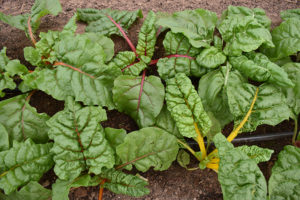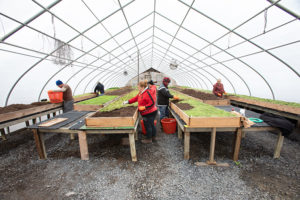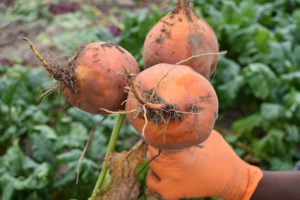(Spanish translation to follow/traducción en español abajo)
Beds of emerald-colored kale and collard greens planted outside shimmer under a late morning sun. Nearby, production staff plant trays of spinach inside hoop houses. It is early autumn at the Hudson Valley Farm Hub and greenhouse production is ramping up.
At the Farm Hub, greenhouses and hoop houses serve as home base for year-round vegetable growing. In 2018 the Farm Hub started growing greens in the winter to step up its donations to food pantries, shelters, and soup kitchens throughout Ulster County, and also to provide off-season work for our production staff. For the second year in a row, the Farm Hub is partnering with the Kingston YMCA Farm Project on the winter market, which is taking place on Thursdays from November 7 through February at the YMCA. This winter’s leafy greens offerings include spinach, kale (curly, dinosaur and Red Russian), collard greens, and the addition of Swiss chard.
In September, the production team started seeding a variety of baby greens, salad mixes, and herbs in the greenhouses, including arugula, cilantro, parsley, and pea shoots, for the winter market. The seedings and harvests will continue throughout the winter with the salad mixes packed into half-pound bags.
Produce sold at the winter market will also feature organically grown carrots, potatoes, sweet potatoes, beets, winter squash, garlic, spinach, cooking greens, baby herbs, salad mixes, parsnips, and more. A portion of the market’s sales support the YMCA Farm Project’s programming.
Jeff Scott, marketing and logistics coordinator, expects the market to attract many community members who are keen on being able to access fresh vegetables throughout the peak winter months. Last year’s market served over 650 customers and nearly 950 pounds of produce was sold, with spinach, kale and mixed salad proving the most popular.
Squash and beets
The tradition of storing sweet potatoes, carrots, garlic, potatoes, and parsnips during the winter holds; however, the selection will be expanded to include winter squash such as butternut squash and Black Futsu, and two varieties of beets: Red Ace and Touchstone Gold.
“The root crops give us more of a winter offering and they are critical for our work plan,” says Jeff Arnold vegetable production manager.
Rosa Villegas, greenhouse assistant, says she is looking forward to the winter growing season and likes the weekly cycle of seeding and harvesting microgreens, and the chance to farm indoors during the coldest months. She has also learned a lot about winter farming such as how to build raised beds for the vegetables.
Finally, year-round production supports additional initiatives such as employment for Kingston youth and the availability of fresh produce during the height of winter.
KayCee Wimbish, project director and farmer at the Kingston YMCA Farm Project, says she is thrilled about the extended varieties of vegetables at the winter market, and looks forward to employing members of the youth farm crew through the winter.
“The winter market is important to the community because it allows us to offer affordably priced local produce into the winter months,” says Wimbish. “People’s need for fresh food doesn’t stop once the weather gets cold.”
–Amy Wu
Innovation in new greenhouses
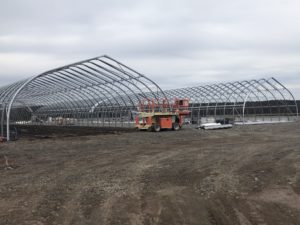
The Farm Hub is adding two new greenhouses; a propagation house and a grow house, both of which are expected to be operational in the spring of 2020. These will eventually replace the existing aging greenhouses. A climate-controlled potting shed that will house seeding equipment is also part of the construction.
“We need more growing space for our winter production and we wanted something a little more state of the art,” says Jeff Arnold, vegetable production manager.
The fresh greens grown indoors at the Farm Hub are primarily donated to community food shelters and sold at the Kingston YMCA winter market. Expanded production will open up additional opportunities to address food insecurity in the region year-round. The greenhouses are also used for seeding vegetables, including broccoli and cauliflower before they are transplanted into the fields.
The new greenhouses will feature the latest technologies in indoor agriculture designed for a smoother workflow and increased production.
The propagation house will have a radiant heating system and smart climate controls that allow temperatures and vents to be adjusted by smartphone. The grow house, which features a soil floor where crops can be grown in the ground, can also be climate controlled via smartphone. With a swipe and click, growers can monitor everything from temperature, moisture, and humidity from their phones or laptops.
Other helpful features include a rolling benchtop system to maximize the available growing space, a watering boom that cuts down on the need for hand watering, and hose trolleys that will run the length of the greenhouse.
“These houses will open a lot of doors for the vegetable operation all year long, but I am really excited about the possibilities for winter growing. We are tripling our space and can produce a lot of crops in the winter that our current infrastructure just won’t allow for,” he says.
Rosa Villegas, the greenhouse assistant, says the new technology – such as the rolling benchtop system and temperature controls – will mean growing a greater variety of vegetables. “I can’t wait to start in the new greenhouses,” Villegas says.
To learn more about Rosa Villegas click on her video portrait at https://vimeo.com/358293171
-Amy Wu
Aumenta la producción de invernadero
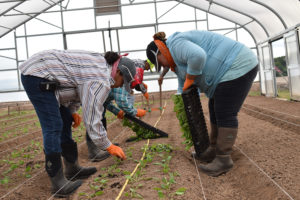
Las coles rizadas (kale) y las acelgas sembradas afuera brillan bajo el sol tardío de la mañana. A poca distancia, el personal de producción siembra espinaca dentro de los invernaderos de arcos. Es casi otoño en Hudson Valley Farm Hub y la producción de invernadero está en aumento.
En Farm Hub, los invernaderos y los invernaderos de arcos sirven como base para el cultivo de vegetales durante todo el año. En 2018, Farm Hub empezó a cultivar vegetales durante el invierno para incrementar sus donaciones a bancos de alimentos, albergues y comedores sociales en todo el condado de Ulster, además de proveer trabajo durante la temporada baja para nuestro personal de producción. Para el segundo año consecutivo, Farm Hub está colaborando con Kingston YMCA Farm Project en el mercado de invierno que se hace en YMCA todos los jueves desde el 7 de noviembre hasta febrero. La oferta de vegetales este invierno incluye espinaca, col rizada (de tres tipos: curly, dinosaurio y Red Russian), acelgas verdes y acelgas suizas rojas.
En septiembre, el equipo de producción empezó a plantar semillas de una variedad de verduras baby, mezclas de ensalada y hierbas en los invernaderos, inclusive arúgula, cilantro, perejil y brotes de arveja para el mercado de invierno. Las plántulas y los cultivos continuarán durante todo el invierno, con mezclas de ensalada que serán empacadas en bolsas de media libra.
Los vegetales vendidos en el mercado de invierno también incluirán cosechas orgánicas de zanahorias, papas, batatas, remolachas, calabazas de invierno, ajo, espinaca, acelgas, hierbas baby, mezclas de ensalada, nabos y más. Una porción de las ventas del mercado es para apoyar la programación de YMCA Farm Project.
Jeff Scott, coordinador de Mercadeo y Logística, espera que el mercado atraiga a muchos miembros de la comunidad que quieran tener acceso a vegetales frescos durante los meses más fríos del invierno. El año pasado, el mercado sirvió a más de 650 clientes y vendió alrededor de 950 libras de vegetales. La espinaca, la col rizada y las mezclas de ensalada resultaron siendo las más populares.
Calabacines y remolachas
La tradición de almacenar batatas, zanahorias, ajo, papas y nabos durante el invierno sigue en pie; sin embargo, la selección se expandirá para incluir calabacines de invierno como calabazas tipo butternut y Black Futsu, y dos variedades de remolachas: Red Ace y Touchstone Gold.
“Los vegetales que son raíces nos permiten tener una mayor oferta durante el invierno y son centrales para nuestro plan de trabajo”, dice Jeff Arnold, gerente de la producción de vegetales.
Rosa Villegas, ayudante del invernadero, dice que le emociona la temporada de cultivo de invierno y le gusta el ciclo semanal de siembra y cosecha de vegetales micro (microgreens), así como la oportunidad de hacer el trabajo agrícola en espacios interiores durante los meses más fríos. Ella también ha aprendido mucho de la agricultura de invierno, incluso cómo construir bancales elevados para los vegetales.
Por último, la producción durante todo el año apoya iniciativas adicionales como empleos para los jóvenes de Kingston y la disponibilidad de vegetales frescos durante el apogeo del invierno.
KayCee Wimbish, directora de los proyectos y agricultora de YMCA Farm Project, dice que está sumamente emocionada por la extensa variedad de vegetales en el mercado de invierno y espera emplear miembros del equipo de jóvenes agricultores durante el invierno.
“El mercado de invierno es importante para la comunidad porque nos permite ofrecer vegetales locales a precios asequibles durante los meses de invierno”, dice Wimbish. “La necesidad que tiene la gente de alimentos frescos no desaparece cuando el invierno se pone frío”.
–Amy Wu
INNOVACIÓN EN LOS INVERNADEROS NUEVOS

Farm Hub está añadiendo dos invernaderos nuevos; uno de propagación y uno de cultivo. Y se espera que ambos estén operacionales para la primavera de 2020. Eventualmente, reemplazarán los invernaderos existentes, que están cada día más viejos. Un cobertizo de macetas con control de temperatura, donde se guardará el equipo para las semillas, también es parte de la construcción.
“Necesitamos más espacio de cultivo para nuestra producción de invierno y queríamos algo de vanguardia”, dice Jeff Arnold, gerente de la producción de vegetales.
Los vegetales frescos que cultivamos en los espacios interiores de Farm Hub principalmente se donan a comedores sociales y albergues, y se venden en el mercado de invierno de Kingston YMCA. Una producción expandida abrirá oportunidades adicionales para atender la inseguridad alimentaria en la región durante todo el año. Los invernaderos también se usarán para sembrar vegetales que incluyan brócoli y coliflor antes de trasplantarlos a los campos.
Los invernaderos nuevos tendrán la última tecnología para la agricultura de interiores, diseñada para un flujo de trabajo más fluido y una mayor producción.
El invernadero de propagación tendrá un radiante sistema de calefacción y controles inteligentes de temperatura que permitirán que la temperatura y la ventilación se ajusten por medio de teléfonos inteligentes. El invernadero, el cual tendrá un piso de tierra donde los vegetales se puedan cultivar, también tendrá control de temperatura por medio de teléfonos inteligentes. Con apenas deslizar y hacer clic, los agricultores pueden monitorear todo, como la temperatura y la humedad, desde sus teléfonos, computadoras o laptops.
Otras características útiles incluyen un sistema de rolado de superficie para maximizar el espacio disponible para cultivar, un sistema de irrigación que reduce la necesidad de regar a mano y carretillas para mangueras que cubran el largo del invernadero.
“Estos invernaderos abrirán muchas puertas para la operación de vegetales durante todo el año, pero me emocionan mucho las posibilidades de cultivo durante el invierno. Estamos triplicando nuestro espacio y vamos a poder producir muchos vegetales en el invierno que nuestra infraestructura actual no permite”, dice.
Rosa Villegas, ayudante del invernadero, dice que la nueva tecnología – como el sistema de rolado de superficie y los controles de temperatura – significa que podrán cultivar una variedad de vegetales. “Tengo muchas ganas de estrenar los invernaderos nuevos”, dice Villegas.
Para más información acerca de Rosa Villegas, haga clic aquí para ver su video: https://vimeo.com/358293171
-Amy Wu

